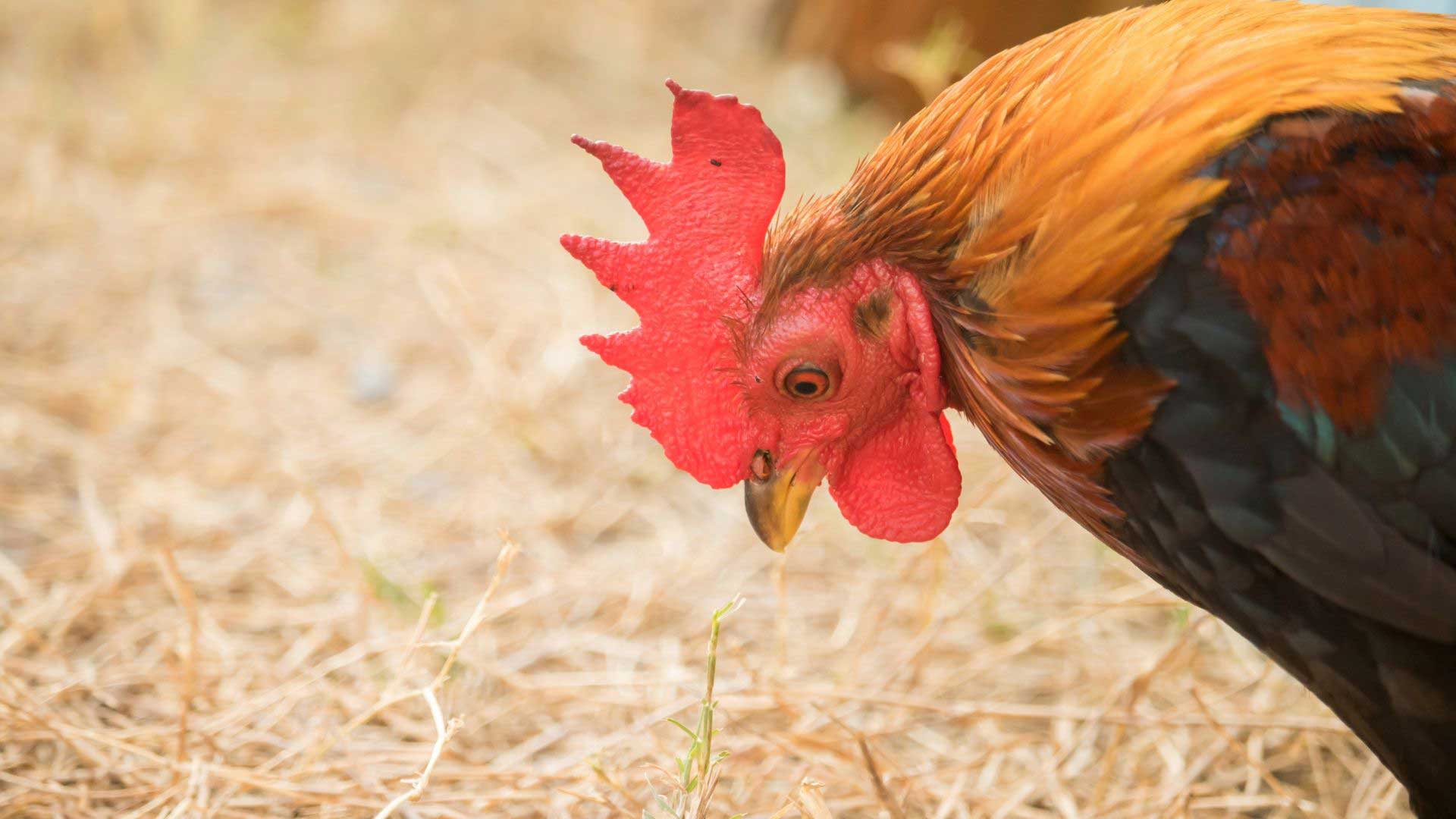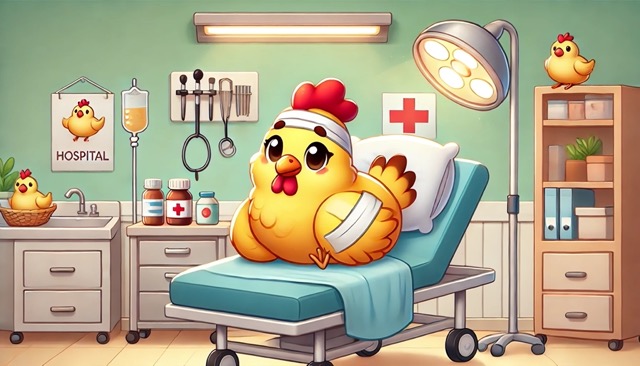Coccidiosis in Chickens - Signs, Symptoms and Treatment
What causes coccidiosis in chickens?
Microscopic parasites called coccidia cause coccidiosis in chickens.
Coccidia infect the digestive tract of all chickens. But in a healthy, adult chicken a small number of 'familiar' coccidia are fine and won't cause health issues.
But unfamiliar coccidia, high levels of coccidia or other health issues can cause chickens to exhibit signs of coccidiosis, which is a severe coccidia infection that can cause illness and death in chickens.
When coccidiosis becomes a problem, if is a big problem. It can spread rapidly through a flock and cause death within days.
If you are a backyard chicken keeper, it is essential to learn how to recognise the signs of coccidiosis in chickens and how to prevent coccidiosis in chickens.
If you already know the signs and need express delivery of coccidiosis treatment for chickens, don't delay.
Shop now: Cocciprol Amprolium Coccidiostat 100 g.
Key Takeaways
- Coccidiosis in chickens is caused by microscopic parasites called coccidia.
- Signs of coccidiosis include bloody diarrhea, lethargy, lack of appetite, pale combs, and death.
- Young, sick, or malnourished chickens are most susceptible to coccidiosis.
- Prevention involves treating young chicks, maintaining a clean coop, and practicing good biosecurity.
- Coccidiosis spreads through oocysts in feces, which can survive up to a year in warm, wet conditions.
- Rapid treatment with Amprolium or Sulfa drugs is crucial to control outbreaks.
- Apple Cider Vinegar has shown potential in reducing coccidial infections and enhancing treatment efficacy.
Coccidiosis in chickens - The Signs
All chickens naturally carry some coccidia in their intestine. Coccidia parasites in small numbers do not cause any symptoms or ill-health. However, signs of coccidiosis needing treatment include:
- Bloody or watery diarrhea
- Lethargy
- Lack of appetite
- Pale combs and wattles
- Droopy posture and wings
- Ruffled or puffed up feathers
- Droopy, dull or glazed eyes
- Poor growth in chicks
- Death
Coccidiosis usually affects:
- New chicks that don't have any immunity to the parasite yet
- Young birds
- Sick or unwell birds
- Birds that are suffering from malnutrition
- Birds suffering from high parasite loads or other stresses
Coccidiosis is unlikely to affect an average, healthy, adult chicken unless you introduce a new strain of the parasite into the chicken coop. Your hens build a resistance to the coccidia they live with over time. They have little to no resistance or immunity to newly introduced coccidia strains. It is the primary cause of a coccidiosis outbreak in the coop and is more common than you’d think.
Coccidia varies greatly between sites. So much so, that your neighbour most likely has different strains than your coop. It is because of this it is so easy to introduce new coccidia. Even dirty shoes from someone else’s coop are enough. This is why chicken coop hygiene and good practices for introducing new birds are so important.
How to treat coccidiosis infections in chickens
Coccidiosis spreads quickly, and the survival of poultry depends on rapid treatment.
While you should always isolate sick birds immediately to prevent the spread of disease, if one bird is ill chances are high that the whole group soon will be.
Treatment for coccodiosis is with sulfa drugs or anticoccidial drugs. Amprolium is an anticoccidial drug available without a prescription and is a fast, highly effective treatment for coccidiosis. Use caution when using Sulfamonaides also know as Sulfas. Sulfa drugs can cause a toxic overdose.
Buy a treatment for coccidiosis in chickens now. Shop Amprolium Cocciprol.
As reported in the Polish Journal of Veterinary Sciences, evidence supports the use of Apple Cider Vinegar to combat coccidiosis. In short, their findings indicated:
- ACV has an anticoccidial effect in poultry
- Causes a decrease in the number of coccidial oocytes in the faeces
- Aids in lowering coccidial resistance to drug treatment
Although this study was limited, further research and studies continue. But so far, that's a great thumbs up for ACV and those backyard chicken keepers who want a more holistic approach and not to rely on drugs or commercially available medications alone. Read the full study
Coccidiosis in chickens - The Causes
Like most intestinal parasites, the spread of coccidiosis is from the eggs (oocysts). These are laid in the gut of the infected host and passed out through their faeces. The life cycle begins again when these eggs are consumed and hatch in the new host’s intestine. The parasite burrows into the gut lining and impairs digestive function as it multiplies and produces more oocysts.
Chicken and wild bird faeces spread oocysts. So even if you have the most stringent plans in place, a stray wild bird can introduce new oocysts to your flock. The eggs survive for up to a year in warm, wet conditions. Maintaining a clean, dry coop can significantly reduce coccidia exposure and parasite loads in your birds.
Coccidiosis outbreaks are associated with:
- Warm, wet conditions
- Unsanitary and overcrowded coop
- Stress caused by illness, high parasite loads, malnutrition
- Environmental changes
As “new” coccidia are the leading cause of coccidiosis in healthy chickens, it is good to be aware of the most common ways they may be introduced to your coop. New coccidia can come from:
- Introducing new birds to the flock – this is the most common cause and can occur even when the birds appear perfectly healthy. Because remember, the new birds have resistance to the strain of coccidia they carry but your birds probably don't.
- Travelling with your birds and bringing them home again, for example attending a chicken show.
- A visiting chicken keeper with oocysts on their shoes, clothing or even vehicle tyres.
- Using equipment that comes from another chicken keeper. Such as buying a preowned coop, feeder or even egg cartons. Any pre-used things coming in must be disinfected as well as thoroughly cleaned.
Practising good chicken coop biosecurity is a must. Once you have the hang of it, honestly it becomes second nature.
Coccidiosis in chickens - Prevention
There are two critical ways to prevent coccidiosis in chickens.
- Treat young chickens until they can develop immunity to coccidia.
- Good coop management, including biosecurity.
Young chicks must be treated to prevent coccidiosis.
While some chicken keepers, in particular, organic chicken keepers, may choose not to treat their chicks for coccidiosis, doing so is good practice. Two treatment options are available:
Vaccination
Usually, commercially purchased chicks and chickens are vaccinated for coccidiosis. But don't just assume, ask the question before taking them home. This vaccination is effective against most strains of the parasite. Most importantly, vaccinated chicks should never be fed a medicated feed as this will nullify the protective effects of both treatments.
Medicated feed
Rather than vaccinate, many backyard chicken keepers raise their chicks on a medicated chick starter. This feed contains a coccidiostat also known as anticoccidiosis medication. It is not strong enough to completely protect the chicks from the disease but is enough protection to help them build the immunity that exists in an adult chicken. Medicated feed should be fed only to chicks. Administer the treatment for up to 8 weeks. This treatment plan aids in preventing Coccidiosis infection in chickens.
Do not consume eggs from chickens that are being treated with medicated feed.
Good coop management can also help prevent coccidiosis in chickens:
- Provide a nutritious, balanced diet
- Treat illness and disease
- Prevent contamination of feed, and water
- Regularly clean dishes or feeders
- Keep the coop dry and clean
- Avoid overcrowding
- Prevent contact with wild birds if possible. Bird netting can help.
- Practice good biosecurity
- Only using clean tools in the chicken coop
- Quarantine and treat new birds prior to introduction in the flock
- Give probiotics, especially if birds are suffering from stress or likely to be exposed to new coccidia, for example when new birds are introduced
- Adding Apple Cider Vinegar to the drinking water has been shown to help prevent the spread of coccidiosis in some studies.
To keep chickens healthy, low exposure to oocysts (coccidia eggs) is also important. Exposure to sunlight, sub-zero temperatures and hot, dry conditions will all kill oocysts on surfaces and in the soil.
Helpful Links:
Dine a Chook Expert articles
Keeping Chickens Healthy in Wet weather
Biosecurity for Backyard Poultry
Buy in our Dine a Chook Online store
Cocciprol Amprolium Anticoccidial Treatment




